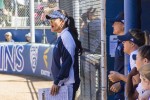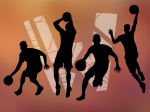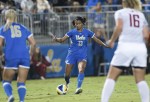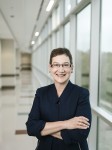The Bruins will build a new team with versatility in mind.
Four incoming freshmen from California will join UCLA softball for the 2019-2020 season as the Bruins have a chance to defend their 2019 national title. Coach Kelly Inouye-Perez said after graduating a large senior class – including starters infielder Brianna Tautalafua and utility Taylor Pack – flexibility was the main appeal of the recruiting class.
“I think this is going to be a class that will impact the field immediately,” Inouye-Perez said. “(Assistant coach Lisa Fernandez) does a great job of recruiting and bringing in just versatile and very athletic players, … which is very similar to this last year. We saw versatility, we saw people play a lot of positions, and I expect exactly that this year”
Middle infielder Maya Brady is ranked as Softball America’s No. 2 recruit in the nation coming out of Oaks Christian High School. Inouye-Perez attributed some of Brady’s talent to the fact that she hails from an athletic family – her mother Maureen Brady was an All-American pitcher at Fresno State in the 1990s, while uncle Tom Brady is a six-time Super Bowl winner as the quarterback for the New England Patriots.
“She’s a product of her environment and obviously has some really athletic genes,” Inouye-Perez said. “I really credit her mom, probably more than anything, and Tom Brady even says great things about his sister. (Maureen Brady) was a very competitive high level softball pitcher at Fresno State, and (Fernandez) and I both competed against her in college when Fresno State was striving for national championships as a program.”
Also joining the Bruins is Seneca Curo, who hit .505 with a 1.448 OPS during her senior year at Ramona High School as a power-hitting shortstop.
Two of the Bruins’ graduated seniors include Tautalafua and Pack, the primary third and first basemen, respectively. Though Brady and Curo both primarily played shortstop in high school, Inouye-Perez said it’s likely that field positions of both returning and incoming players will shift to adapt to the vacancies left by graduated Bruins.
“(Curo and Brady) are two phenomenal, just really talented infielders who can play any infield or outfield position,” Inouye-Perez said. “We’re going to have some versatility again, where first base, third base, are going to be positions that we’re really going to figure out who allows us to be at our best.”
No. 16-ranked right-hander Lexi Sosa will join the UCLA pitching rotation after finishing her senior season at Mater Dei Catholic High School with a 1.07 ERA in 177 and 1/3 innings, collecting a 24-2 record while also hitting .462 with 11 home runs.
With Sosa’s talent in the circle and at the plate, Inouye-Perez drew comparisons between her and rising redshirt senior pitcher Rachel Garcia, who was also a top recruit coming out of high school.
“She hit for big numbers offensively, she can hit it out of the park, and she throws in the mid-to-high 60s, but has really worked on having more movement and the off-speed,” Inouye-Perez said.
No. 11-ranked Alyssa Garcia – who played catcher at Mater Dei – will also be joining Sosa and the Bruins for the 2020 season. Garcia, who also spent time at first base, was characterized by Inouye-Perez as someone who could contribute offensively.
“I really believe she’s someone who’s going to do things, like Taylor Pack, and put up big numbers, hit the long ball, hit for average,” Inouye-Perez said. “She’s someone who has been recognized as one of the top hitters in California, so we’re really excited to have her in the lineup.”
With the start of the season still months away, Inouye-Perez said that even with the talent that the Bruins have already recruited, they are still open to bringing on more players.
“There could always absolutely be potential additions,” Inouye-Perez said. “We graduated a large class, and with that we’re always looking to make sure that we have the depth in our lineup.”






